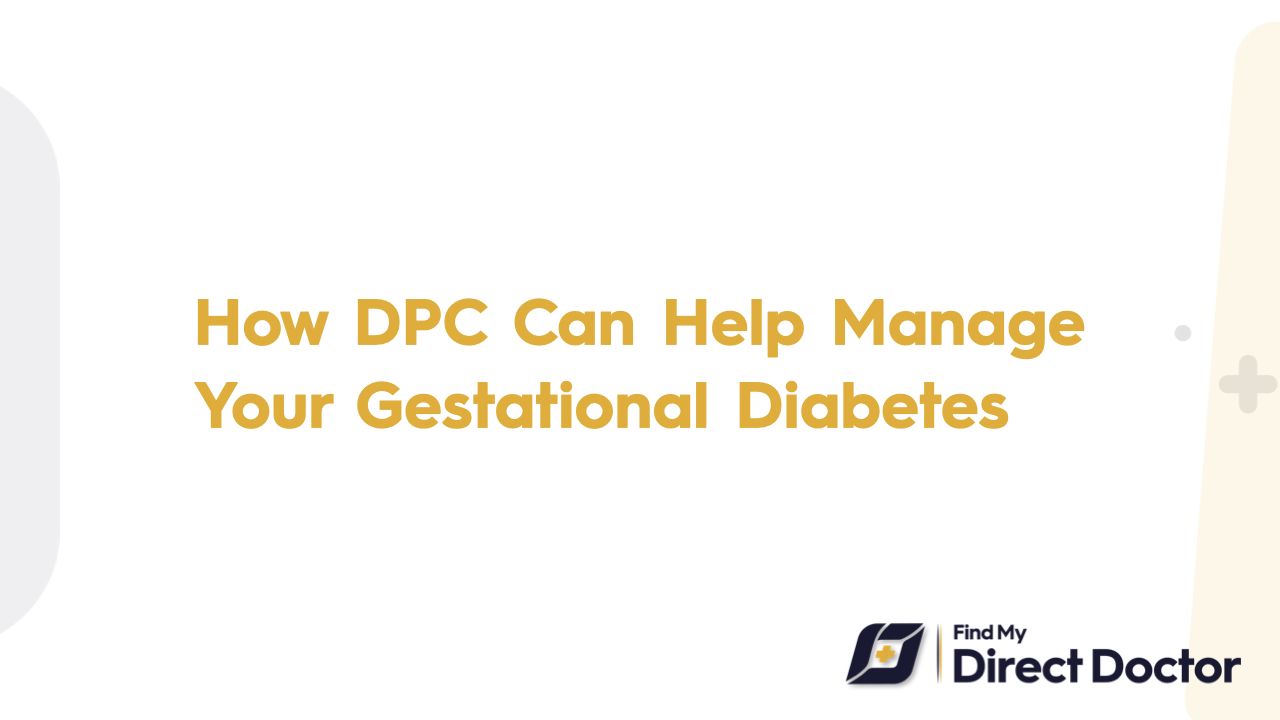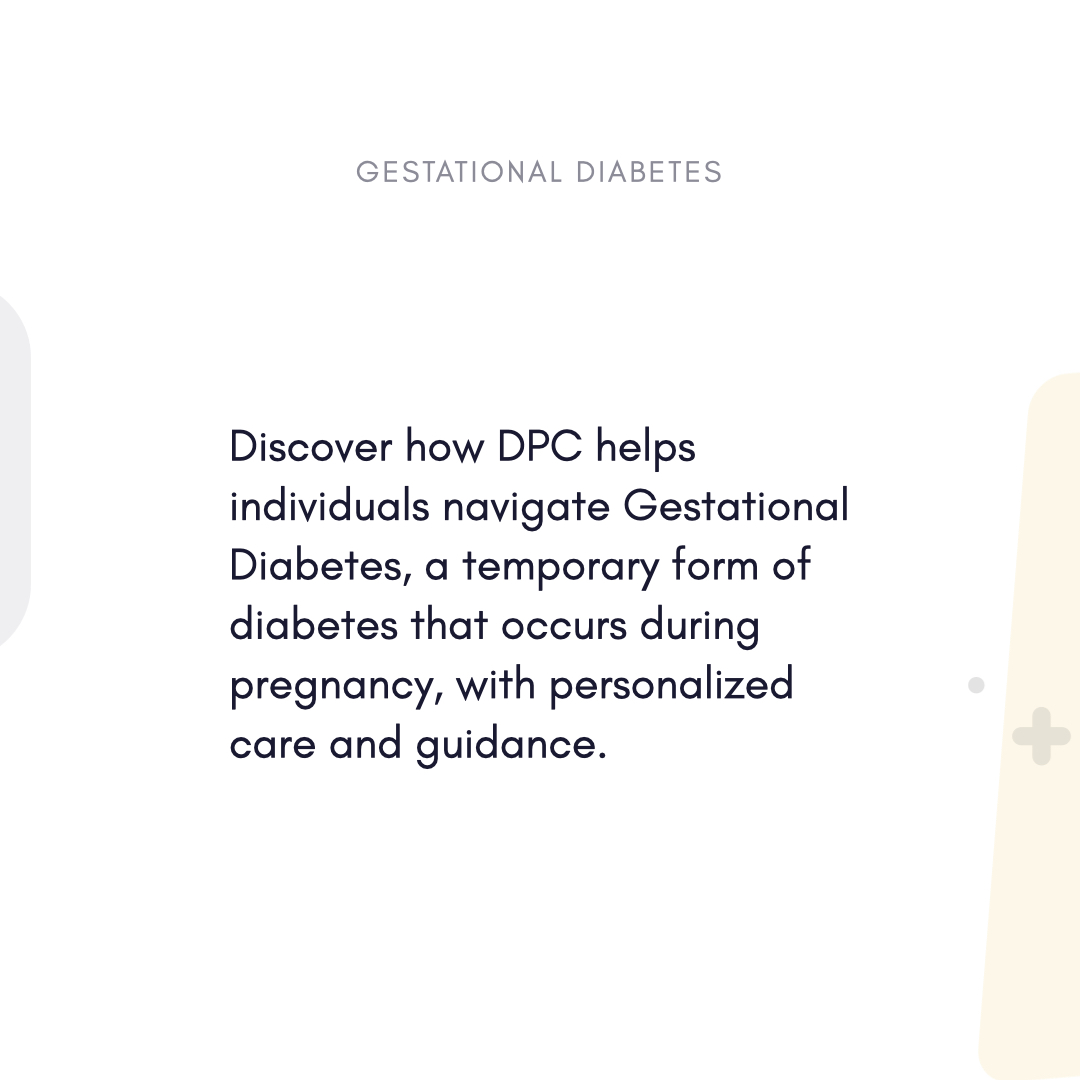Gestational Diabetes and Direct Primary Care (DPC): Your Path to a Healthy Pregnancy
You are not alone if you have been diagnosed with high blood sugar during pregnancy; up to 10% of pregnant women get gestational diabetes (GD). Although this disorder raises preterm birth, preeclampsia, or larger-than-average baby risks, proactive treatment guarantees a good outcome for mother and child. Combining frequent monitoring, customized lifestyle plans, and seamless coordination with experts, Direct Primary Care (DPC) provides a personalized, stress-free approach to manage gestational diabetes free from insurance challenges. Allow me to investigate how.

Realizing Gestational Diabetes
- Pregnancy hormones interfering with insulin's action causes gestational diabetes, a condition marked by raised blood sugar levels. Important information:
- Risk factors: PCOS, family history of diabetes, obesity, past GD.
- Often asymptomatic, symptoms could include tiredness, more thirst, or frequent urination.
- Diagnosis: Oral glucose tolerance test (OGTT) conducted 24 to 28 weeks of pregnancy.
- Long-term risks: Greater likelihood of Type 2 diabetes postpartum for the mother; obesity or diabetes risk for the child.
How DPC Changes GD Care
DPC Changing Gestational Diabetes Management
Typically costing USD 50–150, Direct Primary Care (DPC) is a membership-based model whereby patients pay a monthly fee for unlimited access to their primary care provider. This means consistent, customized treatment to protect your pregnancy for GD sufferers.
DPC changes gestational diabetes care by:
- Individualized Care Anchored in Medical Expertise:
-
- Focusing on: American Diabetes Association (ADA) and American Association of Clinical Endocrinologist (AACE) recommendations, DPC providers follow:
- Regular Observations: Using home glucose meters or in-clinic tests, weekly blood sugar checks—fasting and post-meal.
- Customised Diets: Work with dietitians to create low-glycemic meals balancing carbohydrates, protein, and good fats.
- Safe Prenatal Exercise: Such as swimming or walking—will help raise insulin sensitivity.
- Reasonable, Transparent Treatment:
- 2. DPC clinics eliminate hidden fees to help lower costs. Membership entitles unlimited prenatal visits and glucose monitoring.
- Discounted glucose meters, test strips, or insulin—should it be needed—wholesale-priced supplies.
- By means of proactive care, prevent expensive complications including emergency C-sections.
- Constant Support for Mental Wellness:
- 3. Having 24/7 access to your doctor allows you to change medications or meal plans should blood sugar surges occur.
- Talk about worries regarding unusual symptoms or fetal movement.
- Work easily with endocrinologists, lactation consultants, or OB-GYNs.
Key Benefits of DPC for Gestational Diabetes Patients
- Same-Day Adjustments: Quick reaction to erratic blood sugar levels using direct communication—text, phone, email.
- Holistic Approach: Combines prenatal health, stress management, and dietary counseling.
- Long-Term Support: Relationships with providers improve treatment and postpartum follow-up, so lowering Type 2 diabetes risk.
DPC Customized Gestational Diabetes Management
The DPC model conforms to ADA and AACE guidelines for patient-centered diabetes treatment:
- Early Correction:
- Frequent ultrasounds track levels of amniotic fluid and fetal development.
- Early, if necessary referrals to experts in maternal-fetal medicine.
- Lifestyle Integration:
- Tailored diets meant to avoid spikes (such as combining carbs with protein or fiber).
- Techniques for reducing stress—prenatal yoga, meditation—to steady blood sugar.
- Postpartum Planning:
- Glucose testing following delivery to evaluate diabetes risk.
- Breastfeeding support helps raise mother metabolic health.
Real-Life Success Stories
- Case 1: Maria, 32, suffered with post-meal surges. Her DPC provider prescribed metformin, changed her carb count, and added evening walks. 39 weeks later she delivered a healthy 7-pound baby.
- Case 2: Lisa, 28, avoided insulin treatment with daily glucose monitoring and dietician advice. In six months her postpartum A1C returned to normal.
FAQs: Gestational Diabetes and DPC
- Can GD be controlled without drugs?
- A: Agreed. Many patients control GD with just diet and exercise. DPC offers close observation to decide whether or not medication is required.
- How does DPC address hypoglycemia or other crises?
- A: 24/7 telehealth support system arranges urgent care if necessary and guides patients on quick fixes (such as glucose tablets).
- Will I need insulin?
- A: Only should changes in lifestyle fail. DPC gives non-pharmaceutical approaches top priority initially.
- Does DPC work with my OB-GYN?
- A: True. DPC providers coordinate your care plan and exchange records.
Why DPC Stands Out for Gestational Diabetes Patients
The ADA and AACE stress tight glycemic control and tailored treatment—foundations of the DPC model. By removing insurance hurdles, DPC guarantees:
- Timely Interventions: Change course before problems start.
- Tools to Confidently Manage GD: At home.
- Continuous Postpartum Help: To lower Type 2 diabetes risk.
Take Control of Your Pregnancy Health Right Now
Gestational diabetes does not have to take front stage over the delight of pregnancy. Using DPC gives you a partner who values your health, finances, and peace of mind—offering professional treatment free from delays.
All set to guarantee a normal pregnancy? Look for a DPC provider close by and get proactive, caring healthcare.
How DPC Specifically Helps Gestational Diabetes Patients
Rooted in accessibility, education, and teamwork, DPC's framework directly tackles GD issues:
- Proactive Management: Early interventions and frequent visits help avoid complications.
- Direct Communication: Phone, email, or text instant access to providers.
- Affordable Care: Visits and supply access lower financial stress during pregnancy.






